初中英语形容词顺序版
- 格式:doc
- 大小:43.50 KB
- 文档页数:3
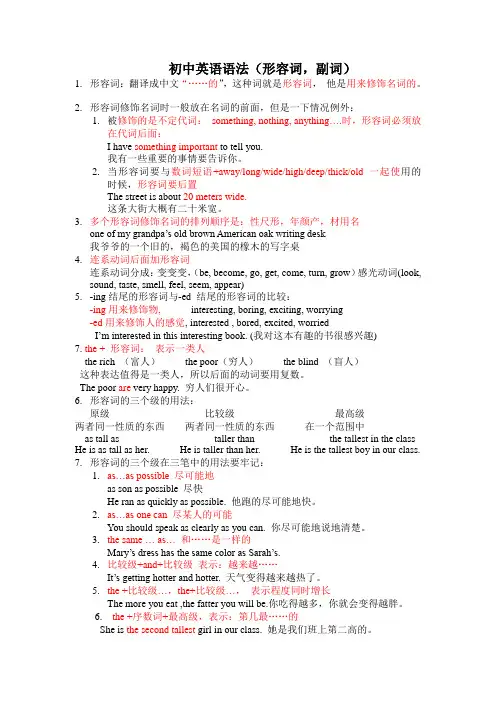
初中英语语法(形容词,副词)1.形容词:翻译成中文“……的”,这种词就是形容词,他是用来修饰名词的。
2.形容词修饰名词时一般放在名词的前面,但是一下情况例外:1.被修饰的是不定代词:something, nothing, anything….时,形容词必须放在代词后面:I have something important to tell you.我有一些重要的事情要告诉你。
2.当形容词要与数词短语+away/long/wide/high/deep/thick/old 一起使用的时候,形容词要后置The street is about 20 meters wide.这条大街大概有二十米宽。
3.多个形容词修饰名词的排列顺序是:性尺形,年颜产,材用名one of my grandpa’s old brown American oak writing desk我爷爷的一个旧的,褐色的美国的橡木的写字桌4.连系动词后面加形容词连系动词分成:变变变,(be, become, go, get, come, turn, grow)感光动词(look, sound, taste, smell, feel, seem, appear)5.-ing结尾的形容词与-ed 结尾的形容词的比较:-ing用来修饰物,interesting, boring, exciting, worrying-ed用来修饰人的感觉, interested , bored, excited, worriedI’m interested in this interesting book. (我对这本有趣的书很感兴趣)7. the + 形容词:表示一类人the rich (富人)the poor(穷人)the blind (盲人)这种表达值得是一类人,所以后面的动词要用复数。
The poor are very happy. 穷人们很开心。
6.形容词的三个级的用法:原级比较级最高级两者同一性质的东西两者同一性质的东西在一个范围中as tall as taller than the tallest in the class He is as tall as her. He is taller than her. He is the tallest boy in our class.7.形容词的三个级在三笔中的用法要牢记:1.as…as possible 尽可能地as son as possible 尽快He ran as quickly as possible. 他跑的尽可能地快。
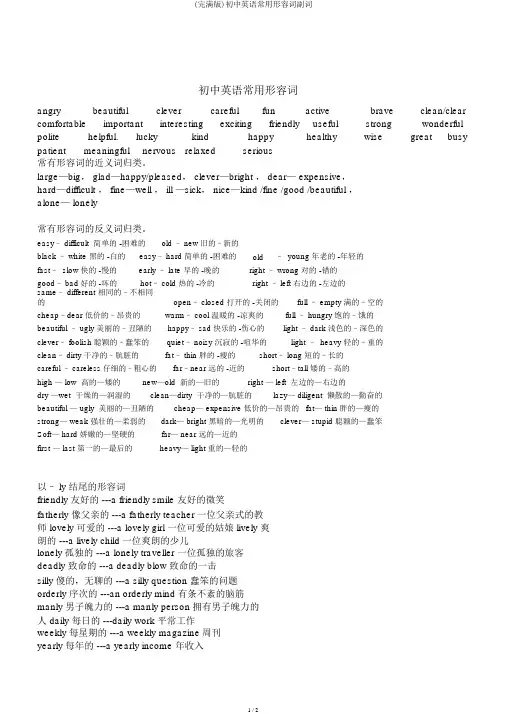
初中英语常用形容词angry beautiful clever careful fun active brave clean/clear comfortable important interesting exciting friendly useful strong wonderful polite helpful.lucky kind happy healthy wise great busy patient meaningful nervous relaxed serious常有形容词的近义词归类。
large—big, glad—happy/pleased, clever—bright , dear— expensive,hard—difficult , fine—well , ill —sick, nice—kind /fine /good /beautiful ,alone— lonely常有形容词的反义词归类。
easy– difficult 简单的 -困难的old – new 旧的–新的black – white 黑的 -白的easy– hard 简单的 -困难的old– young 年老的 -年轻的fast– slow 快的 -慢的early – late 早的 -晚的right – wrong 对的 -错的good– bad 好的 -坏的hot– cold 热的 -冷的right – left 右边的 -左边的same– different 相同的–不相同的open– closed 打开的 -关闭的full – empty 满的–空的cheap–dear 低价的–昂贵的warm– cool 温暖的 -凉爽的full – hungry 饱的–饿的beautiful – ugly 美丽的–丑陋的happy– sad 快乐的 -伤心的light – dark 浅色的–深色的clever– foolish 聪颖的–蠢笨的quiet– noisy 沉寂的 -喧华的light – heavy 轻的–重的clean– dirty 干净的–肮脏的fat– thin 胖的 -瘦的short– long 短的–长的careful – careless 仔细的–粗心的far–near 远的 -近的short–tall 矮的–高的high — low 高的—矮的new—old 新的—旧的right — left 左边的—右边的dry —wet 干燥的—润湿的clean—dirty 干净的—肮脏的lazy— diligent 懒散的—勤奋的beautiful — ugly 美丽的—丑陋的cheap— expensive 低价的—昂贵的 fat— thin 胖的—瘦的strong— weak 强壮的—柔弱的dark— bright 黑暗的—光明的clever— stupid 聪颖的—蠢笨Soft— hard 娇嫩的—坚硬的far— near 远的—近的first — last 第一的—最后的heavy— light 重的—轻的以– ly 结尾的形容词friendly 友好的 ---a friendly smile 友好的微笑fatherly 像父亲的 ---a fatherly teacher一位父亲式的教师 lovely 可爱的 ---a lovely girl 一位可爱的姑娘 lively 爽朗的 ---a lively child 一位爽朗的少儿lonely 孤独的 ---a lonely traveller 一位孤独的旅客deadly 致命的 ---a deadly blow 致命的一击silly 傻的,无聊的 ---a silly question 蠢笨的问题orderly 序次的 ---an orderly mind 有条不紊的脑筋manly 男子魄力的 ---a manly person 拥有男子魄力的人 daily 每日的 ---daily work 平常工作weekly 每星期的 ---a weekly magazine周刊yearly 每年的 ---a yearly income 年收入副词的分类副词按词汇意义可分为:方式副词: well , fast,slowly , carefully , quickly程度副词: very , much, enough, almost, rather, quite地点副词: here, there, out, somewhere, abroad, home哪些单词既是形容词又是副词初中常有的有 :fast, hard, enough, early, late,t,high,far方式副词:well (好地)fast(快地 )carefully(小心地 )quickly (快地)sadly(伤心地)badly (严重地,特别)carelessly(粗心地)slowly (慢慢地)politelyproperly (合适地,完满地)(有礼貌地)proudly (骄傲地),successfully (成功地)happily (快乐地)angrily (生气地,气愤地)。
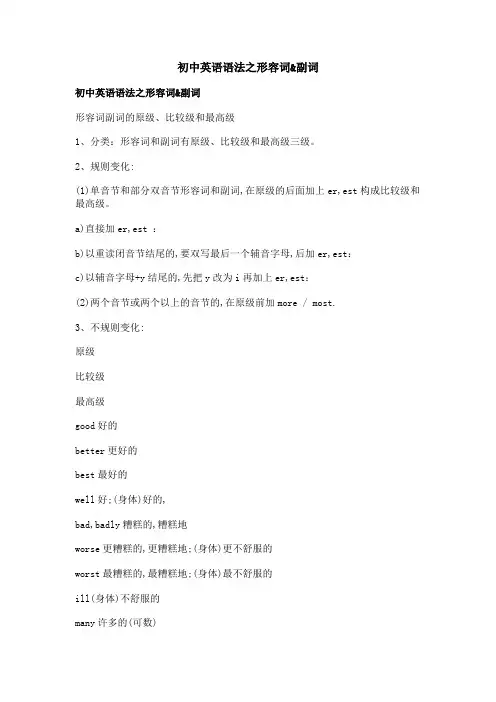
初中英语语法之形容词&副词初中英语语法之形容词&副词形容词副词的原级、比较级和最高级1、分类:形容词和副词有原级、比较级和最高级三级。
2、规则变化:(1)单音节和部分双音节形容词和副词,在原级的后面加上er,est构成比较级和最高级。
a)直接加er,est :b)以重读闭音节结尾的,要双写最后一个辅音字母,后加er,est:c)以辅音字母+y结尾的,先把y改为i再加上er,est:(2)两个音节或两个以上的音节的,在原级前加more / most.3、不规则变化:原级比较级最高级good好的better更好的best最好的well好;(身体)好的,bad,badly糟糕的,糟糕地worse更糟糕的,更糟糕地;(身体)更不舒服的worst最糟糕的,最糟糕地;(身体)最不舒服的ill(身体)不舒服的many许多的(可数)more更多的;更most最多的;最much许多的(不可数);非常little少的less更少的least最少的far远的;远地farther更远的;更远地farthest最远的;最远地further进一步的(地)furthest最深刻的(地)4、形容词和副词的原级、比较级和最高级的用法:(1) 讲述某人/物自身的情况时,用原级。
基本句型是:主语(sb./sth) + 谓语动词+(very/too/so/quite/rather…) + 形容词/副词原级+….如:He is very oldnow. 他现在很老了。
They ran quitefast. 它们跑得相当快。
The weatherlooks rather bad. 天气看上去相当糟。
I am sohappy! 我是如此的快乐!☆表示两者之间没有差别时,使用句型:主语(第一个人物) + 谓语动词 + as + 形容词/副词原级 + as + 第二个人物+….如He is as excited as his younger sister. 他和他妹妹一样兴奋。
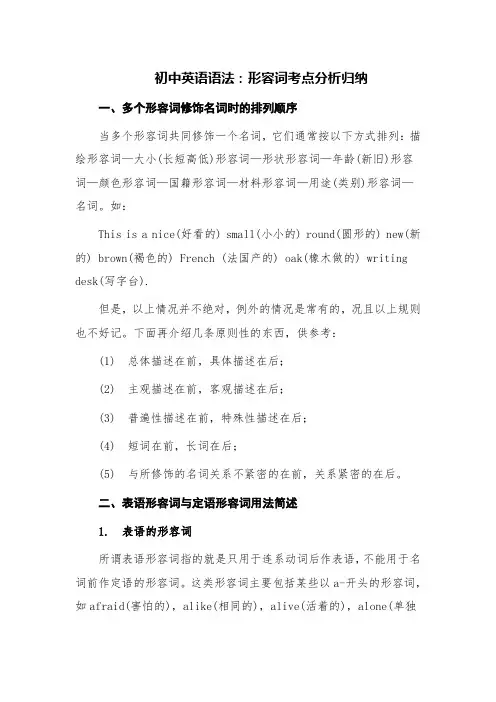
初中英语语法:形容词考点分析归纳一、多个形容词修饰名词时的排列顺序当多个形容词共同修饰一个名词,它们通常按以下方式排列:描绘形容词—大小(长短高低)形容词—形状形容词—年龄(新旧)形容词—颜色形容词—国籍形容词—材料形容词—用途(类别)形容词—名词。
如:This is a nice(好看的) small(小小的) round(圆形的) new(新的) brown(褐色的) French (法国产的) oak(橡木做的) writing desk(写字台).但是,以上情况并不绝对,例外的情况是常有的,况且以上规则也不好记。
下面再介绍几条原则性的东西,供参考:(1) 总体描述在前,具体描述在后;(2) 主观描述在前,客观描述在后;(3) 普遍性描述在前,特殊性描述在后;(4) 短词在前,长词在后;(5) 与所修饰的名词关系不紧密的在前,关系紧密的在后。
二、表语形容词与定语形容词用法简述1. 表语的形容词所谓表语形容词指的就是只用于连系动词后作表语,不能用于名词前作定语的形容词。
这类形容词主要包括某些以a-开头的形容词,如afraid(害怕的),alike(相同的),alive(活着的),alone(单独的),ashamed(羞愧的),asleep(睡着的),awake(醒着的),aware(意识到的)等。
如:He was half asleep. 他半睡着。
You are lucky to be alive. 你活着算是幸运的了。
The twins look very much alike. 这对双胞胎看上去非常相像。
其他的表语形容词还有(主要限于括号内的意思):fine(健康的),ill(有病的),poorly(健康欠佳的),well(身体健康的),glad(高兴的),pleased(高兴的),sorry(难过的),upset(心烦意乱的),content(满意的),certain (确信的),sure(确信的),fond(喜欢的),ready(准备好的)等。
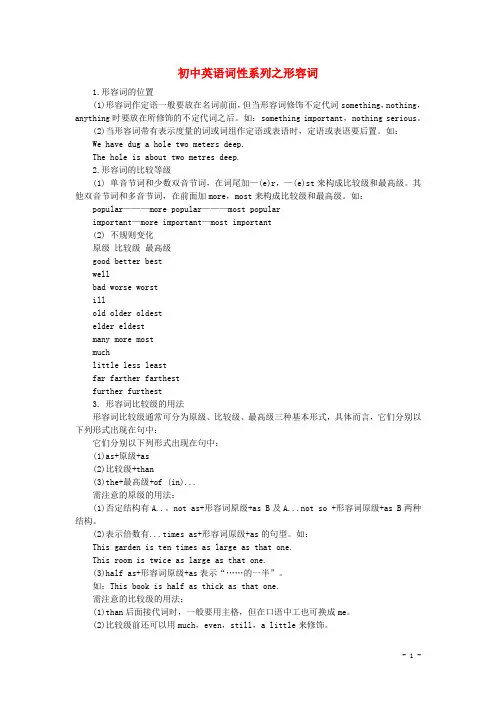
初中英语词性系列之形容词1.形容词的位置(1)形容词作定语一般要放在名词前面,但当形容词修饰不定代词something,nothing,anything时要放在所修饰的不定代词之后。
如:something important,nothing serious。
(2)当形容词带有表示度量的词或词组作定语或表语时,定语或表语要后置。
如:We have dug a hole two meters deep.The hole is about two metres deep.2.形容词的比较等级(1) 单音节词和少数双音节词,在词尾加—(e)r,—(e)st来构成比较级和最高级。
其他双音节词和多音节词,在前面加more,most来构成比较级和最高级。
如:popular———more popular———most popularimportant—more important—most important(2) 不规则变化原级比较级最高级good better bestwellbad worse worstillold older oldestelder eldestmany more mostmuchlittle less leastfar farther farthestfurther furthest3. 形容词比较级的用法形容词比较级通常可分为原级、比较级、最高级三种基本形式,具体而言,它们分别以下列形式出现在句中:它们分别以下列形式出现在句中:(1)as+原级+as(2)比较级+than(3)the+最高级+of (in)...需注意的原级的用法:(1)否定结构有A..。
not as+形容词原级+as B及A...not so +形容词原级+as B两种结构。
(2)表示倍数有...times as+形容词原级+as的句型。
如:This garden is ten times as large as that one.This room is twice as large as that one.(3)half as+形容词原级+as表示“……的一半”。

初中英语知识点归纳形容词与副词的位置形容词和副词在英语语法中扮演着重要的角色,对于初学者来说,正确地使用形容词和副词是一项基本技能。
而形容词与副词的位置则决定了句子的表达和理解。
本文将对初中英语知识点进行归纳,探讨形容词和副词在句子中的正确位置。
一、形容词的位置1. 形容词作定语形容词通常用来修饰名词,作为定语出现在名词的前面。
例如:- a beautiful house(一个漂亮的房子)- a tall boy(一个高个子的男孩)2. 形容词作表语形容词也可以作为主语的表语出现在句子中,用来描述主语。
例如:- The book is interesting.(这本书很有趣)- She seems tired.(她看起来很累)3. 形容词作宾语补足语形容词可以作为动词的宾语补足语,补充说明宾语的特征。
例如:- He found the movie boring.(他觉得电影很无聊)- They painted the walls blue.(他们把墙壁涂成蓝色)二、副词的位置1. 副词作状语副词通常用来修饰动词、形容词或其他副词,作为状语出现在句子中。
例如:- He speaks English fluently.(他流利地说英语)- She sings beautifully.(她唱得很美)2. 副词作独立性状语有些副词在句子中可以作独立性状语,放在句首或句尾,用来表示说话者的感受或看法。
例如:- Luckily, we passed the exam.(幸运地,我们通过了考试)- I will go, of course.(当然,我会去)3. 副词作宾语补足语副词也可以作为动词的宾语补足语,补充说明宾语的程度或方式。
例如:- They cleaned the room thoroughly.(他们彻底地清洁了房间)- He drove the car carefully.(他小心地开车)三、形容词和副词的转化有一些词兼具形容词和副词的性质,它们在句子中既可以作为形容词使用,也可以作为副词使用。
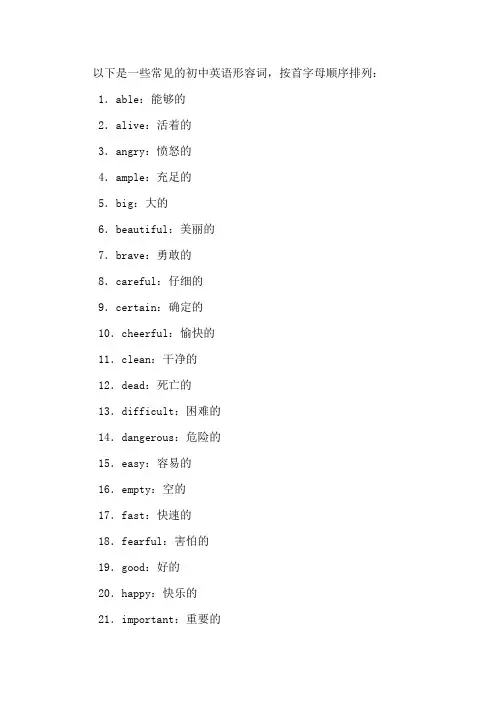
以下是一些常见的初中英语形容词,按首字母顺序排列:1.able:能够的
2.alive:活着的
3.angry:愤怒的
4.ample:充足的
5.big:大的
6.beautiful:美丽的
7.brave:勇敢的
8.careful:仔细的
9.certain:确定的
10.cheerful:愉快的
11.clean:干净的
12.dead:死亡的
13.difficult:困难的
14.dangerous:危险的
15.easy:容易的
16.empty:空的
17.fast:快速的
18.fearful:害怕的
19.good:好的
20.happy:快乐的
21.important:重要的
22.jolly:愉快的
23.kind:友好的,和蔼的24.lively:活泼的,生动的25.merry:欢乐的,愉快的26.nice:美好的,愉快的27.open:打开的,开明的28.polite:有礼貌的29.poor:贫穷的,可怜的30.quiet:安静的
31.rapid:快速的,迅速的32.sad:悲伤的,难过的33.safe:安全的
34.tall:高的
35.vibrant:充满活力的36.warm:温暖的37.wonderful:精彩的,绝妙的38.xeric:干燥的39.yellow:黄色的40.zippy:活泼的。
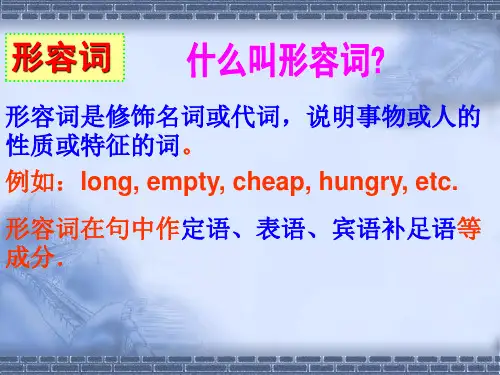
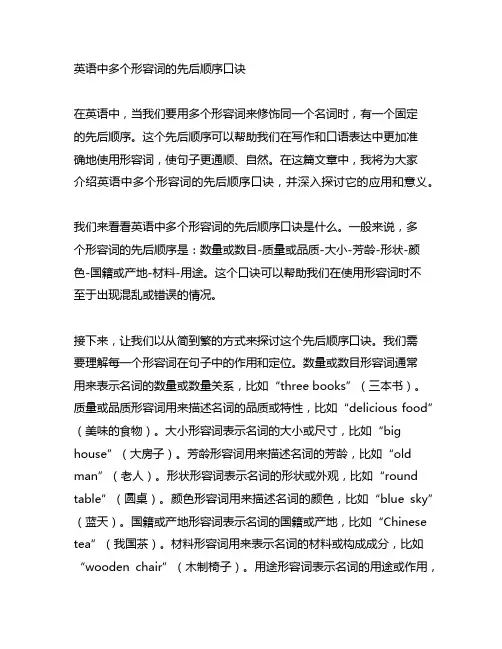
英语中多个形容词的先后顺序口诀在英语中,当我们要用多个形容词来修饰同一个名词时,有一个固定的先后顺序。
这个先后顺序可以帮助我们在写作和口语表达中更加准确地使用形容词,使句子更通顺、自然。
在这篇文章中,我将为大家介绍英语中多个形容词的先后顺序口诀,并深入探讨它的应用和意义。
我们来看看英语中多个形容词的先后顺序口诀是什么。
一般来说,多个形容词的先后顺序是:数量或数目-质量或品质-大小-芳龄-形状-颜色-国籍或产地-材料-用途。
这个口诀可以帮助我们在使用形容词时不至于出现混乱或错误的情况。
接下来,让我们以从简到繁的方式来探讨这个先后顺序口诀。
我们需要理解每一个形容词在句子中的作用和定位。
数量或数目形容词通常用来表示名词的数量或数量关系,比如“three books”(三本书)。
质量或品质形容词用来描述名词的品质或特性,比如“delicious food”(美味的食物)。
大小形容词表示名词的大小或尺寸,比如“big house”(大房子)。
芳龄形容词用来描述名词的芳龄,比如“old man”(老人)。
形状形容词表示名词的形状或外观,比如“round table”(圆桌)。
颜色形容词用来描述名词的颜色,比如“blue sky”(蓝天)。
国籍或产地形容词表示名词的国籍或产地,比如“Chinese tea”(我国茶)。
材料形容词用来表示名词的材料或构成成分,比如“wooden chair”(木制椅子)。
用途形容词表示名词的用途或作用,比如“cooking oil”(烹饪油)。
在我们对这个先后顺序口诀进行了深入的理解之后,让我们来看看它在实际应用中的意义。
这个先后顺序口诀可以帮助我们更加准确、清晰地表达自己的意思。
在写作和口语表达中,准确地使用多个形容词可以让句子更加生动、精确,给读者或听众留下深刻的印象。
在描述一张桌子时,我们可以说“A beautiful small round wooden Italian dining table”(一张美丽的小圆形意大利进餐桌),这样的表达更加具体和生动。
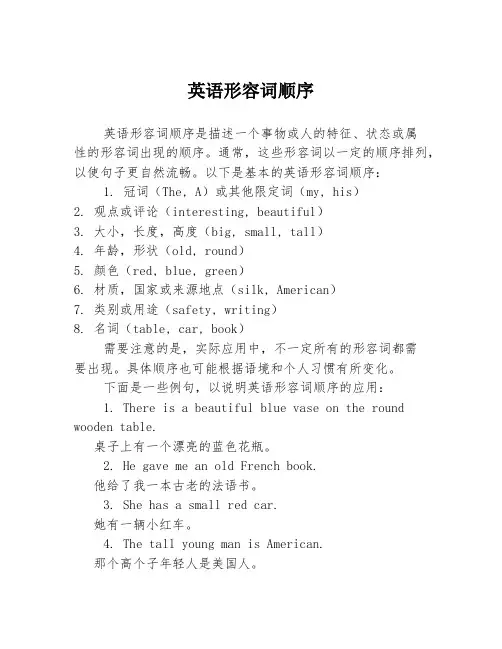
英语形容词顺序英语形容词顺序是描述一个事物或人的特征、状态或属性的形容词出现的顺序。
通常,这些形容词以一定的顺序排列,以使句子更自然流畅。
以下是基本的英语形容词顺序:1. 冠词(The, A)或其他限定词(my, his)2. 观点或评论(interesting, beautiful)3. 大小,长度,高度(big, small, tall)4. 年龄,形状(old, round)5. 颜色(red, blue, green)6. 材质,国家或来源地点(silk, American)7. 类别或用途(safety, writing)8. 名词(table, car, book)需要注意的是,实际应用中,不一定所有的形容词都需要出现。
具体顺序也可能根据语境和个人习惯有所变化。
下面是一些例句,以说明英语形容词顺序的应用:1. There is a beautiful blue vase on the round wooden table.桌子上有一个漂亮的蓝色花瓶。
2. He gave me an old French book.他给了我一本古老的法语书。
3. She has a small red car.她有一辆小红车。
4. The tall young man is American.那个高个子年轻人是美国人。
5. I bought a lovely little white puppy from the local pet store.我在当地宠物店买了一只可爱的小白狗。
6. I need a large square wooden table for my dining room.我需要一张大的方形木质餐桌放在我的餐厅。
7. It's a dangerous electric device.这是一个危险的电子设备。
以上只是一些例子,英语形容词顺序并非都要严格遵守,而是更多地遵循语言的习惯和流畅度。
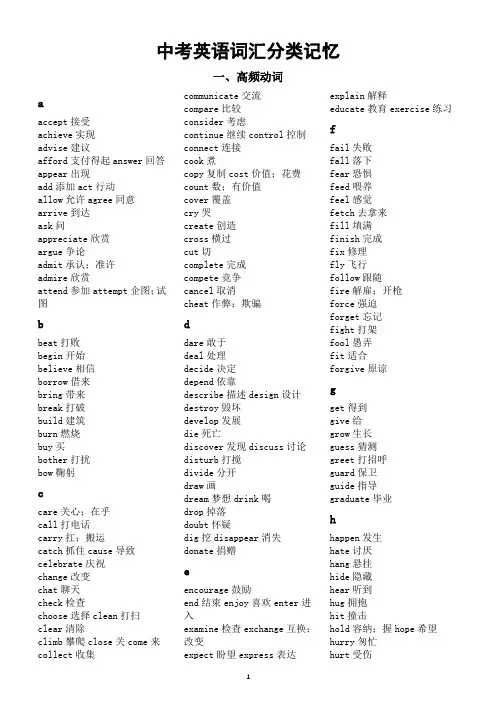
中考英语词汇分类记忆一、高频动词aaccept接受achieve实现advise建议afford支付得起answer回答appear出现add添加act行动allow允许agree同意arrive到达ask问appreciate欣赏argue争论admit承认;准许admire欣赏attend参加attempt企图;试图bbeat打败begin开始believe相信borrow借来bring带来break打破build建筑burn燃烧buy买bother打扰bow鞠躬ccare关心;在乎call打电话carry扛;搬运catch抓住cause导致celebrate庆祝change改变chat聊天check检查choose选择clean打扫clear清除climb攀爬close关come来collect收集communicate交流compare比较consider考虑continue继续control控制connect连接cook煮copy复制cost价值;花费count数;有价值cover覆盖cry哭create创造cross横过cut切complete完成compete竞争cancel取消cheat作弊;欺骗ddare敢于deal处理decide决定depend依靠describe描述design设计destroy毁坏develop发展die死亡discover发现discuss讨论disturb打搅divide分开draw画dream梦想drink喝drop掉落doubt怀疑dig挖disappear消失donate捐赠eencourage鼓励end结束enjoy喜欢enter进入examine检查exchange互换;改变expect盼望express表达explain解释educate教育exercise练习ffail失败fall落下fear恐惧feed喂养feel感觉fetch去拿来fill填满finish完成fix修理fly飞行follow跟随fire解雇;开枪force强迫forget忘记fight打架fool愚弄fit适合forgive原谅gget得到give给grow生长guess猜测greet打招呼guard保卫guide指导graduate毕业hhappen发生hate讨厌hang悬挂hide隐藏hear听到hug拥抱hit撞击hold容纳;握hope希望hurry匆忙hurt受伤1handle处理;控制iimprove提高include包括increase增加imagine想象impress印象interview采访introduce介绍invite邀请invent发明influence影响jjoin参加jump跳跃jog慢跑kkeep保持kick踢kill杀kiss亲吻knock敲门llast持续laugh笑lay摆放;下蛋lie躺;位于lift举起lead领导list列举listen听litter乱丢lock锁light照亮lend借出mmajor主修manage管理mark标注marry嫁娶match匹配mean意思是mend修理mention提到mind介意mistake犯错move移动mail邮寄miss思念;错过master掌握memorize记忆nnod点头note注意notice通知oobey遵守;服从offer提供operate操作;手术own拥有order命令organize组织overcome克服oversleep睡过头ppack包装park停车paint油漆pay付款pass通过;传递perform表演pick捡place放置practice练习point指出praise赞扬prepare准备prove证明provide提供pull拉promise承诺protect保护produce生产prevent阻止pardon原谅;请再说一遍push推;对……施加压力plan计划plant种植prefer更喜欢pierce刺polish打磨pour倾倒rraise提高rise上升reach到达realize意识到recite背诵record记录refuse拒绝regard看待regret后悔remain保持receive收到rent出租repair修理repeat重复rush冲remind提醒rest休息recall回忆report报道research研究review回顾;复习risk冒险recycle循环再利用require要求reflect反映reuse再使用reply回复reduce减少roll卷ring响铃ssatisfy令人满意sail航行search研究set树立shake摇晃save节省sell销售seem似乎serve招待;服务send发送shut关闭show展示shout呼喊shoot射击share分享shine照耀sort分类spell拼写steal偷stick坚持store储藏suit适合suggest建议succeed成功study研究suppose猜想;料想supply供给surprise使人惊讶sweep打扫solve解决support支持2separate分离smoke抽烟spread传播smile微笑stare盯着看score得分sign签名select选择struggle奋斗ttaste品尝throw扔trust信任translate翻译travel旅行turn转变;轮流train训练tie绑;系trade贸易touch触碰treat招待;对待;治疗trick欺诈wwait等wake唤醒warn警告wash洗waste浪费watch观看wave挥手weigh称重welcome欢迎win赢wipe擦拭wonder想知道worry担忧write写wound受伤wish许愿whisper耳语;小声说二、形容词副词aable能够的awful可怕的active活跃的afraid恐惧的alive活着的amazing令人惊异的angry生气的asleep睡着的anxious焦虑的actually实际的alike相同的alone孤独的Asian亚洲的absent缺席的accidental意外的abroad海外的;国外的bbeautiful美丽的blind盲的boring无聊的born出生的bright明亮的;聪明的brave勇敢的busy忙的basic基本的;基础的believable可信的burning燃烧的blonde金色的ccareful小心的careless粗心的certain确定的cheap便宜的clean干净的clear干净的clever聪明的close关着的cloudy多云的colorful多彩的comfortable舒服的common普通的;共同的confident自信的confusing令人困惑的convenient方便的correct正确的crazy疯狂的creative创造性的crowded拥挤的cruel残酷的cute可爱的caring关心他人的central中央的crispy脆的complex复杂的ddangerous危险的dark黑的;暗的dead死亡的daily日常的direct直接的deaf聋的deep深的delicious美味的different不同的difficult困难的disappointing令人失望的dry干的down失望的dirty脏的double双的;双倍的eeasy容易的embarrassed尴尬的empty空的expensive贵的excited感到兴奋的exciting令人兴奋的extra额外的electronic电子的energetic精力充沛的Environmental环境的eastern东方的European欧洲的ffat肥胖的fast快速的3far远的famous著名的fair公平的favorite最喜欢的foreign外国的free空闲的;免费的friendly友好的full满的;饱的funny有趣的;滑稽的fit适合的fantastic极好的fearless无畏的foolish愚蠢的folk民间的gglad高兴的gentle温柔的gradually逐渐地golden金色的general一般的;大概的grey灰色的hhard困难的;坚硬的hardly几乎不hardworking努力的helpful有帮助的helpless无助的healthy健康的huge巨大的honest诚实的homeless无家可归的hungry饥饿的harmful有害的haunted闹鬼的high高的handsome帅的historical历史的iimportant重要的impossible不可能的injured受伤的interesting有趣的impolite不礼貌的international国际的intelligent聪明的incredible难以置信的jjust公正的junior初级的kkind友善的knowledgeable知识渊博的llarge大的late晚的latest最新的lifelong终生的local当地的low低的lazy懒惰的lively活泼的lonely孤独的locked锁上的likely可能地mmagic魔术的main主要的most最;大部分modern现代的mad疯的musical音乐的moving感人的mobile移动的medical医药的nnational国家的natural自然的nearby附近的necessary必要的nervous紧张的normal平常的northern北方的next下一个oown自己的outstanding出色的outgoing外向的opposite对面的;相反的open开放的pparticular特别的personal个人的patient耐心的painful疼痛的perfect完美的popular受欢迎的possible可能的poor贫穷的polite有礼貌的proud自豪的proper适当的pretty漂亮的pleasant令人愉快的pleased感到高兴的professional专业的pink粉色的pale苍白的part-time兼职的plenty大量的poor穷的private私人的qquiet安静的quite相当的quick快的rrainy下雨的rapid迅速的relaxing令人轻松的relaxed感到放松的regular规律的rude粗鲁的recently最近reasonable合理的ready准备好的ssick生病的shy害羞的slow慢的sleepy困乏的similar相似的4simple简单的silly愚蠢的silent沉默的smart聪明的smooth顺滑的social社会的soft柔软的smart聪明的stupid愚蠢的strict严格的serious严肃的spare空闲的strange陌生的strong强大的successful成功的sudden突然的sweet甜的surprising令人惊讶的surprised感到惊讶的sure肯定的senior高级的secret秘密的safe安全的scientific科学的tthick厚的;浓的thin瘦的;薄的tired累的tiring令人疲惫的thankful感激的tidy整洁的true真实的thirsty渴的tiny微小的total全部的typical典型的uugly丑陋的upset心烦的upstairs楼上的useful有用的useless无用的usual通常的understanding善解人意的wweak虚弱的well-known众所周知的wounded受伤的warm温暖的western西方的whole整个的wide宽的white白色的wet湿的worth值得的wise智慧的wonderful精彩的wrong错误的worst最差的5。
初中英语三年形容词分级归纳整理教研室孙巧玲初中三年共有280左右个形容词,分别为大家列出来,同时选了一些例子让大家更多了解形容词在不同年级使用的情况。
七年级上册(35 words):big black blue boring brown busy cool dear difficult easy English fat fine favorite first free fun good great green red happy healthy interesting late last long nice purple relaxing small short useful white yellowExample:I am very busy on Friday. At 8:00 I have math. It is not fun. The teacher says it is useful, but I think it is difficult. Then at 9:00 I have science. It is difficult but interesting. After that I have P.E. It is easy and fun.七年级下册(40 words):afraid American bad beautiful cloudy cold cute delicious different dirty early excellent exciting expensive fast free friendly funny handsome heavy important interested large lazy lovely lucky natural new noisy popular scared shy smartstraight sunny tall thin tired windy young Example 1:We visited the Science Museum and it was really interesting. At the museum, I learned a lot about robots. I didn’t know they could play chess with us. It was so cool! I took a lot of great photos, too. After that, I went to the gift shop and bought some lovely gifts for my parents. They weren’t expensive. All in all, it was an exciting day.Example 2:I think today’s school trip was terrible. We took the train to the museum. It was so hot on the slow train. The museum was big and boring. Everything was about robots and I’m not interested in that. The rooms were really dark and it was difficult to take photos, so I didn’t take any. The things in the gift shop were so expensive. I didn’t like the trip at all.八年级上册(48 words):able angry available bored careful careless comfortable common creative crowded dangerous educational enjoyable famous fantastic foreign fresh full glad hard-working hungry impossible least loud meaningless necessary normal outgoing own personal physical poor possiblepretty ready sad serious similar simple successful surprised talented traditional understanding unlucky upset wet wonderfulExample 1:Laura once lost her wallet, and worried for days. She was afraid to tell her parents about it. She just kept thinking,” If I tell my parents, they’ll be angry! In the end, she talked to her parents and they were really understanding. Her dad said he sometimes made careless mistakes himself. They got her a new wallet and asked her to be more careful.Example 2:Everyone is good at something, but some people are truly talented. It’s always interesting to watch other people show their talents. Talent shows are getting more and more popular. First, there were shows like American Idol and America’s Got Talent. Now, there are similar shows around the world, such as China’s Got Talent.八年级下册( 60 words):amazing adult ancient awake blind brave bright broken certain clear crazy deaf deep disabled endangered excited fallen freezing German honest huge icy ill independentIndian Japanese lonely magic modern nervous peaceful perfect proper quick rapid remaining safe shocked sick silly social soft strange strong stupid sunburned sweet thick truthful typical unbelievable unfair unusual usual weak Western whole wide wild wrongExample:Linlin: Last year I went to the Hangzhou National Tea Museum. It’s a relaxing and peaceful place near a lake. The art performances show how to make a perfect cup of tea with beautiful tea sets. Watching the tea preparation is just as enjoyable as drinking the tea itself. I’ve finally realized why my grandpa loves drinking tea and collecting tea sets.九年级全册(94 words):absent accidental active African alive Asian Australian basic believable British burning Canadian caring central convenient correct crispy cruel daily dead direct down east eastern electronic embarrassed embarrassing empty environmental European everyday fascinating folk grey hard-working harmful haunted helpful historical humorous impolite inexpensive intelligentinternational lifelong lively local medical mobile moving musical national northern painful part-time patient pink plastic polite present prime private professional proud public relaxed responsible reusable salty scientific secret senior separate silent sleepy smooth sour spare sudden teenage thankful thirsty tiny total ugly underground uncomfortable uncrowded uneasy unexpected valuable west wooden worthExample 1:He always wanted to be a professional runner when he grows up. But we think our son needs to think about other possible jobs. My parents have always taught me how important it is to work hard at school and enter university. I understand this, but I’m serious about running. It’s the only thing I’ve ever wanted to do. Example 2:These days, something unusual is happening in our town. Victor,a teacher at my school, is really nervous. Everyone in our town is feeling uneasy.小结:形容词恰当的使用使文章变得丰满而形象。
英语形容词在初中阶段的用法总结如下:形容词的位置:形容词一般放在名词前作定语。
例如:She has a beautiful dress.(她有一条漂亮的裙子。
)形容词也可以放在系动词后面作表语。
常见的系动词有be, look, seem, smell, taste, sound, keep等。
例如:This kind of food tastes delicious.(这种食物尝起来很美味。
)当形容词修饰由some、any、every、no等构成的不定代词时,通常放在不定代词之后。
例如:I have something important to tell you.(我有一些重要的事情要告诉你。
)形容词的比较级和最高级:形容词有原级、比较级和最高级三种形式,用于表示事物的不同程度。
例如:big(原级),bigger(比较级),biggest(最高级)。
比较级用于两者之间的比较,通常由than引出比较的对象。
例如:He is taller than me.(他比我高。
)最高级用于三者或三者以上的比较,前面通常要加定冠词the,后面可以带of/in短语来表示比较的范围。
例如:She is the smartest girl in our class.(她是我们班最聪明的女孩。
)形容词的修饰语:形容词可以被副词修饰,表示程度的加深或减弱。
例如:very beautiful(非常漂亮),quite good(相当好)。
一些表示数量的词也可以修饰形容词,如a lot, much, many, enough等。
例如:She is a lot happier now.(她现在快乐多了。
)形容词的否定:形容词的否定通常在形容词前加not,但需要注意的是,当形容词前有系动词时,not应加在系动词后面。
例如:This book is not interesting.(这本书没有趣。
)另外,也可以通过加前缀来构成否定形容词,如un-, in-, dis-等。
初中英语数词和形容词的用法数词用来表示数目,可以分为基数词和序数词两类:一、基数词:基数词是表示具体数目的词,除了序数词以外,都属于基数词,例如:one、two、three、four、five、six、seven、eight、nine、ten 等,它们的构成规则也比较简单。
二、序数词:序数词主要用于表示顺序,如第一、第二、第三等。
它的构成规则比较特殊,通常在基数词后面加th得到,例如:one→first;two→second;three→third;four→fourth;five→fifth;six→sixth;seven→seventh;eight→eighth;nine→ninth;ten→tenth等。
注意:序数词前面一般用冠词the,但是表示年份和时要用基数词,如:This is the fifth time I've seen the film.(这是我看这部电影的第五次了。
)That was 1991.(那是1991年。
)形容词用来修饰名词,通常放在名词的前面,使句子更加生动形象。
形容词可以表示事物的质量、样子、大小、颜色、国籍或民族等,例如:good(好的)、bad(坏的)、nice(漂亮的)、big(大的)、small(小的)、red(红色的)、Chinese(中文的)等。
在句子中,形容词的用法灵活多样,在形容词前面通常要用冠词,如:a nice book(一本好书)the big tree(那棵大树)an old man(一位老人)some young girls(一些年轻的女孩)my good friend(我的好朋友)总之,数词和形容词是英语中非常基础的语法和词汇,学好这些对于学好英语来说非常重要。
形容词一、形容词的构成(一)由名词加后缀变成形容词:1.-al 如nature --- natural, nation --- national2.-ful 如use --- useful, help --- helpful, hope --- hopeful3.-ous 如danger --- dangerous, fame --- famous4.-ant/-ent 如importance --- important,confidence --- confident5.-ry 如anger --- angry, hunger --- hungry6.-ish/-like 如fool --- foolish, self --- selfish, girl --- girlish7.-ly 如friend --- friendly, brother --- brotherly, man --- manly8.-y 如luck --- lucky, sun --- sunny, milk --- milky9.-some 如trouble --- troublesome, hand --- handsome10.-en 如wood --- wooden, gold --- golden, wool --- woolen11.-ern 如east --- eastern, west --- western12.-less 如help --- helpless, hope --- hopeless, home --- homeless (二)由动词加后缀变成形容词:1.-able/-ible 如move --- movable, comfort --- comfortable2.-ive 如act --- active, attract --- attractive, impress --- impressive (三)天生就是形容词:如fat, thin, short, tall, high, long, fast, far, slow, quick等。
第五章形容词思维导图知识梳理一、形容词的定义形容词是用来描述或修饰名词的词,表示人或事物的性质和特征,一般放在所修饰名词之前;若修饰不定代词则放其后.二、形容词的构成和特征形容词通常具有自己独特的后缀形式,多数形容词以下列后缀结尾.后缀例词-able, - ible valuable有价值的comfortable 舒服的terrible糟糕的-al, -ical national国家的natural自然地medical医学的-ant pleasant 令人愉快的important重要的assistant辅助的-ary necessary必要的ordinary普通的secondary次要的-ful beautiful漂亮的wonderful精彩的carefu1l细心的-less useless无用的careless粗心的helpless无助的-ly lovely可爱的friendly友好的lively活泼的-ous,-ious dangerous危险的delicious美味的serious严肃的-some handsome英俊的tiresome烦人的troublesome令人烦恼的-y rainy多雨的sunny阳光充足的snowy多雪的三、形容词的分类根据其构成形式,形容词可以分为简单形容词和合成形容词两类:分类构成例词简单形容词adj. -合成形容词num.+“-”+n.A two-week visit to Pakistan一次对巴基斯坦为期两周的访问num./adj.+“-”+n.+edA three-legged desk三条腿的桌子A kind-hearted man一位好心的男子adj.+“-”+v.-ing An easy-going man一位随和的男子n.+“-”+v.-ed A man-made wonder一个人造奇观adv.+“-”+v.-ed A well-known pianist一位著名的钢琴家四、形容词的句法功能(一)作定语It's a beautiful present.这是一件漂亮的礼物.少数形容词,如little, live(活的),elder, eldest等只能作定语,不能作表语.(二)作表语The film is very interesting.这部电影很有趣.You look young for your age.你看起来比实际年纪要年轻.点拨有些形容词在句中只能用作表语.如:alive活的,awake醒着的,asleep睡着的,afraid害怕的,alike相似的,alone单独的,alight燃着的,点燃的,ashamed对······感到羞耻的、惭愧的,drunk 喝醉的,m生病的,sorry难过的,后悔的,unable不能的,worth值得的,well安好的,glad高兴的,sure确信的.(三)作宾语补足语I find it pleasant to work with him.我发现与他共事很愉快.We should keep our hands dean.我们应该保持手的干净.(四)作主语补足语The house was found empty.房子发现是空的.(五)作独立成分Strange to say, he won the first in the race.说也奇怪,他在比赛中竟得了第一名.点拨有些形容词可以和定冠词连用,表示一类人或东西,这时它接近一个名词,叫做名词化的形容词,它们可充当名词所能充当的主语、宾语等句子成分.这类形容词有blind, deaf, sick, poor, rich, old, young, new, wounded等.(1)泛指一类人,表示复数概念,作主语时谓语动词要用复数形式(2)指抽象事物,作主语时谓语动词要用单数形式The good are happy.善者长乐.(作主语)We should respect the old and love the young.我们应该尊老爱幼.(作宾语)The true is to be distinguished from the false.真伪要辨明.类似的还有:the beautiful美的东西,the good好的东西,the new新的东西,the ordinary普普通通的东西,the unusual 不寻常的东西.五、形容词的位置(一)作定语用的形容词1.作定语用的形容词通常位于所修饰的名词的前面He went a long way.他走了很远.There are many trees in the park.公园里有许多树.点拨形容词的排列顺序有几个形容词修饰一个名词时,它们的排列顺序一般为:限定词(包括冠词、物主代词、指示代词、不定代词等)→数词→描绘形容词(短词在前,长词在后)→表示特征的形容词(包括大小、长度、形状、年龄、新旧等)→表示颜色的形容词→表示类属的形容词(包括国籍、专有形容词和表示材料质地的形容词)→名词定语(包括动名词)→被修饰的名词,如:Jane wore a pretty purple silk dress.珍妮穿着一件漂亮的紫色真丝衣服.a useful big green plastic box 一个实用的大绿色塑料盒子2.但在下列情况下,形容词却放在它所修饰的名词之后(1)当被修饰的词是不定代词something, anything, nothing, somebody等词时,形容词作定语要后置.There is nothing wrong with him.他没有错.Is there anything new in that book?那本书里有什么新东西吗?(2)形容词短语作定语时,要放在所修饰的名词的后面.这些形容词短语多由“形容词+介词(或不定式)”构成.It's a problem difficult to solve.这是一个难以解决的问题.I think he is a man suitable for the job.我认为他是适合做这项工作的人.(3)当形容词由数词修饰时,形容词要放在所修饰的名词的后面.常见的这种形容词有:long, high, tall, wide, deep, old, young等.This is a river two hundred miles long.这是一条200英里长的河流.It is a bridge eight metres wide.那是一座8米宽的桥梁.(4)enough作形容词修饰名词时,既可后置,也可放在名词的前面.We have enough time/time enough to do the work.我们有足够的时间做这项工作.We haven't got enough money/money enough for that kind of thing.我们没有足够的钱去买那类东西.(5)带后缀-able和-ible的形容词和all, every, only或形容词最高级连用,放在所修饰的名词后面.I think Tom is the best person available.我认为汤姆是现有的最好人选.This is the only solution possible.这是唯一可行的解决方法.(二)作表语用的形容词作表语用的形容词通常放在连系动词:be, become, get, look, turn, keep, seem, grow, fall等词的后面.Generally speaking, it is cold in the north; it is warm in the south.一般来说,北方天气冷,南方天气暖和.The two brothers look quite alike.这兄弟俩长得很相像.六、形容词比较级和最高级的构成形容词可以靠改变形式来表示程度的不同.我们把这种变化形式叫做比较等级.要比较两个或两个以上的人或物时,就必须用形容词的比较级和最高级.形容词有三个级:原级,比较级和最高级.(一)规则变化构成方法原级比较级最高级单音节词和少数双音节词一般在词尾加-er读/ə/,-est读/ɪst/talllongclevertaller/'tɔ:lə/longer/'lɒŋgə/cleverer/'klevərə/tallest/'tɔ:lɪst/longest/'lɒŋgɪst/cleverest/'klevərɪst/ 以字母e结尾加-r或-stnicefinelatenicer/'naɪsə/finer/'faɪnə/later/'leɪtə/nicest/'naɪsɪst/finest/'faɪnɪst/latest/'leɪtɪst/重读闭音节词末只有一个辅音字母应先双写这个辅音字母再加-er, -est.bigthinhotbigger/'bigə/thinner/'θɪnə/hotter/'hɒtə/biggest/'bɪgɪst/thinnest/'θɪnɪst/hottest/'hɒtɪst/ 以辅音字母结尾的双音节词改“y”为i,再加-er或-esteasyearlyhappyeasier/'i:zɪə/earlier/'ɜːlɪə/happier/'hæpɪə/easiest/'i:ziɪst/earliest/'ɜːliɪst/happiest/'hæpiɪst/多音节词和部分双音节词在词前加more或mostdeliciousbeautifulpopularcarefulmore deliciousmore beautifulmore popularmore carefulmost deliciousmost beautifulmost popularmost careful有少数形容词的比较级和最高级形式变化是不规则的,如下表: 原级比较级最高级good好的/well健康的better较好的best最好的bad坏的/ill病的worse较坏的worst最坏的many许多/much许多more较多的most最多的little小的;少的less较小的;较少的least最小的;最少的far远的farther更远的further更进一步farthest最远的furthest最远的;最大程度的old老的;旧的older较老的;较旧的elder较年长的oldest最老的;最旧的eldest最年长的(1)少数单音节词既可加后缀-er,-est,又可用more, most构成比较级和最高级.如:calm, free, fit, fond, huge, true, pale等.(2)下面的形容词既可把y改为i,再加-er,-est,又可以用more, most构成比较级和最高级.如:angry, cloudy, lucky, rainy, sleepy, sunny, unhappy, uneasy, windy, worthy等.七、形容词原级、比较级、最高级的用法(一)原级的用法1.表示双方程度相等,用“as+形容词原级+as"结构,意思是“······和…….一样”.基本句型:主语+谓语(系动词)+as+形容词原级+as+比较对象Mike is as tall as Tom.迈克和汤姆一样高.He is as busy as before.他还是和以前一样忙.2.表示“不如”或“不相等”用“not+ as/so+形容词原级+as+比较对象”Jack is not so tall as his grandpa.杰克不及爷爷高.Li Lei is not as good at maths as Li Ping.李磊不如李平数学学得好.点拨表示倍数,如“一半/两倍/三倍/四倍/······”等用“half/twice/three/four/...times+ as...as...”结构.I study twice as hard as you.我学习比你努力一倍.We got three times as many people as we expected.来人的数目是我们预期的三倍.(二)比较级的用法1.表示两个人或事物进行比较时,用比较级基本句型:主语+谓语(系动词)+形容词比较级+than+比较对象He is taller than his father.他比他父亲高.Our classroom is larger than yours.我们的教室比你们的大.2.形容词的比较级前可用much, far, a lot ,still, no, a little, even, any, a great deal等状语来修饰This is even harder than steel.这个东西甚至比铁还硬.I've made a lot more mistakes than you (have).我犯的错误比你犯的多多了.3.可用“比较级+and+比较级”结构(两个同义形容词比较级,后面不接than从句),表示“越来越······”的意思She became more and more interested in music.她对音乐越来越感兴趣了.When summer comes, the days get longer and longer.夏季到来后,白天越来越长.4.用“the+比较级...,the+比较级...”,表示“越······,(就)越·····.”The more careful you are, the less mistakes you will make.你越仔细,出错越少.The more exercises you do, the healthier you will become.你越多锻炼,就越健康.点拨如要表示“主语比他或他所在单位的其他人、物都······”,要用“than any other...”,以便把自己排除在外.这个房间比房子里别的房间都大.误:This room is larger than any room in the house.正:This room is larger than any other room in the house.5.more/less than表示“不仅,不止,多过/不到,少于”的意思Hibernation is more than sleep.冬眠不仅仅是睡眠.点拨“not+形容词比较级+than”和“no+形容词比较级+than”的区别.试比较:He is not older than 20.他还不到20岁.(言其小)He is no older than 20.他过不了20岁.(也许20岁,也许不到)6.英语里的比较级有时并无具体的含义,这种比较级叫绝对比较级younger generation年轻一代higher education 高等教育senior citizens 老年人superior quality 优质(三)最高级的用法1.表示三个或三个以上的人或事物的比较,其中一个在某方面超过其他几个时,用最高级.最高级前一般要加定冠词the,后面跟带of或in表范围的短语He is the tallest in the class.他是全班中最高的.This is the best film that I have ever seen.这是我所看过的最好的一部电影.2.one of the+最高级,表示“是最······之一”Shanghai is one of the most beautiful cities in China.上海是中国最美丽的城市之一.Our city is one of the safest cities in the world.我们城市是世界上最安全的城市之一.3.“most+复数名词”“most of the+复数名词”或”most of+代词”,表示“大多数,大部分的······”Most of the boys are good.大多数的男孩是好样的.Most of them(his books) were written here.他的大部分书是在这儿写的.4.形容词的最高级前可以有by far, next, second, third, nearly等修饰语Canada is the second largest country in the world.加拿大是世界上面积第二大的国家.点拨(1)形容词最高级前一般都用定冠词,但当形容词最高级前有物主代词时,则不用定冠词.Today is my happiest day.今天是我最高兴的一天.Give my best regards to your family.请代我向你们全家问好.(2)most有时与形容词连用,前面用不定冠词或不用冠词,意为“非常,很,极其”,用来加强语气.这时它不表示最高级的概念.He is a most friendly fellow,他是个极友好的人.八、没有比较等级的形容词有相当数量的形容词是没有比较等级的,只能用原级来表示.主要分为以下几类:(一)以ly结尾的形容词daily(每天的) weekly(每周的) monthly(每月的)yearly(每年的) brotherly(兄弟般的) sisterly(姐妹般的)(二)表示事物性质、材料的成分的形容词wooden(木制的) silken(丝制的)electric(电力的) industrial(工业的)(三)表示时间的形容词present(当今的) past(过去的) future(将来的)then(当时的) once(从前的) previous(以前的)(四)与几何形状相关的形容词vertical(垂直的) round(圆的)cubic(立方形的) triangular(三角形的)(五)表示国籍的形容词Chinese(中国的) American(美国的)Japanese(日本的) Korean(朝鲜的)(六)表示方位的形容词east(东面的) west(西面的) middle(中间的) right(右边的)left(左边的) southern(南方的) northern(北方的)(七)表示某种绝对状态的形容词dead(死的) deaf(聋的) blind(瞎的) dumb(哑的)(八)表示“终极”意义的形容词absolute(绝对的) entire(完全的) whole(全部的)thorough(彻底的) complete(完全的) total(整个的)(九)表示顺序和独一概念的形容词first(第一的) last(最后的) next(下一个的) following(以下的)only(唯一的) unique(独一的) matchless(举世无双的) unprecedented(史无前例的)(十)一些仅用作表语的形容词afraid(害怕的) ashamed(惭愧的) asleep(睡着的)alive(活着的) awake(醒着的)(十一)部分表示数量及不定量含义的形容词twins(双胞胎的) duplicate(双重的) quadruple(四倍的)some(一些) several(几个的) certain(某一的)九、部分形容词的用法比较(一)alone与lonely其区别:alone指“独自一人”或“只有”,而lonely则强调孤单的感觉,指人时,意为“孤独”,指地方时,意为“荒凉的”“无人居住的”.试比较:He likes living alone by himself.他喜欢独自一人居住.Though he was alone in the island, he didn't feel lonely.虽然他独自一人在岛上,但他并不觉得寂寞.(二)all和whole二词都可译为“整个的”“全部的”,其区别:1.修饰单数可数名词或抽象名词时,它们可以互换,但词序不同:all放在the, this, that, my, your等词之前,whole则放在之后She has worked all the afternoon.=She has worked the whole afternoon.她工作了整个下午.All our family went there.=Our whole family went there.我们全家都去那儿了.2.修饰复数可数名词时,all的意义是“所有的”,whole的意义是“整整的”,不可互换All students will go there for a meeting.所有的学生都将去那儿开会.(三)black和dark都可作形容词,也可作名词其区别:black的意思是“黑色(的)”,指颜色,其反义词是white;而dark的意思是“暗、天黑、黑暗”,指无光.All the windows have been painted black.所有的窗户已经漆成黑色.(四)beautiful, pretty和handsome都可译为“美”其区别:beautiful指华而美,不用于男子.pretty 可爱而美,多用于女孩、孩子.handsome指外表英俊的样子,主要用于男子.(五)broad和wide常可互换但是,形容肩、背、胸等的宽阔须用broad;形容口、眼睛的大须用wide.(六)big和large的区别这两个词都是“大”的意思,在许多情况下它们可以互相换用.一般地说,large的“大”,着重在面积、范围上面.big用得比较广泛,除了指体积、重量或容量等方面的“大”外,还可以表示“巨大”“伟大”“重要”的意思.He had a large family to support.他要养活一个人口众多的家庭.There is a big tree in front of his house.他家门前有一棵大树.(七)childish和childlike的区别1.childish一般用于贬义,意思是“幼稚的”“傻气的”,指成年人缺乏控制力和约束力,而且可能有任性、不理智、不耐心和只顾自己之意,人们很少用它来形容孩子I think she is childish.我认为她很幼稚.2.childlike用于褒义,意思是“孩子般天真的”.它也指成年人具有孩子般的稚嫩和诚实,也有天真无邪、无拘无束、热情或殷切之意(八)either, both, neither都含有“两者”的意思either表示“两者中的任何一个”,是单数意思,它后面跟单数名词,作主语时,谓语动单数形式.both表示“两者都”,是复数意思,它后面跟复数名词,作主语时,谓语动词用形式.neither表示“两者中的任何一者都不”,是否定含义,它后面跟单数名词,谓语动词数形式.试比较: Either book is interesting.这两本书(中的任何一本)都很有趣.Both books are interesting.这两本书都很有趣.Neither book is interesting.这两本书(中的任何一本)都没趣.(九)few和little二词都可表示具有否定意义的“很少”“几乎没有”,其区别:few用于可数名词前,反是many; little用于不可数名词前,反义词是much.同样,具有肯定意义的词组a few用来可数名词;a little 用来修饰不可数名词.试比较:A few students came to the meeting.有几个学生参加了会议.There is little water in the glass.杯子里几乎没水了.(十)high和tall二词均可表示“高”,其区别:high通常用于物之高,而tall常用于指人的个子及细长building和pole用high或tall都可以.(十一)sleepy和asleep1.sleepy的意思是“想睡的,困乏的,寂静的”,我们可以说:a sleepy valley(寂静谷),它既可当定语,又可当表语I am so sleepy that I can hardly keep my eyes open.我很困,眼睛几乎都睁不开.2.asleep是“睡觉的,睡熟的”意思,它只能作表语The minute my head touched the pillow I fell asleep.我头一碰枕头就睡着了.好题精练一、写出下列形容词的比较级和最高级1.clean_________ _________2.nice_________ _________3.early_________ _________4.far_________ _________5.careful_________ _________6.low_________ _________7.cheap_________ _________ 8.cool_________ _________9.thin_________ _________ 10.good_________ _________答案:1.cleaner,cleanest2.nicer,nicest3.earlier,earliest4.farther/further, farthest/furthest5.more careful, most careful6.lower,lowest7.cheaper,cheapest 8.cooler,coolest9.thinner,thinnest 10.better,best二、用括号内所给词的适当形式填空1.Tom was so_________ (angry) that he said nothing.2.In summer it's_________ (hot) in Wuhan than in Beijing.3.Which is_________ (difficult),physics or biology?4.This book is_________ (interesting) than the other two. It is_________ (interesting) of the three.5.It's becoming_________ (hard) to find a job in China.6.Tom has only one brother, and his_________ (old)brother is three years. _________ (old) than me. My_________ (young) brother is about two years_________ (young) than me. But he is the_________ (strong) among us.7.Can you show me_________ (near)shop here?8.This bridge is as_________ (long) as that one ,but it is much_________ (wide) than that one.9.My bag seemed to get. _________ (heavy) as I carried it.10.I think English is one of_________ (important) subjects in middle school.11.Tom is_________ (young) child in his family. His parents love him best.12.This part is of the_________ (little) importance of all.答案:1.angry2.hotter3.more difficult4.more interesting, the most interesting5.harder and harder6.elder,older,younger,younger,strongest7.the nearest 8.long,wider9.heavier and heavier 10.the most important11.the youngest 12.least三、选择填空1.He's much_________ today, but she is even_________.A. well; worseB. well; betterC. better; illD. better; worse2.I don't think she is_________ you.A. so old asB. as old soC. as old thanD. better3.Each of us was too tired to go any_________.A. farB. farerC. much fartherD. farther4.Which do you like_________, fish, meat or chicken?A. wellB. betterC. bestD. most5.The Huanghe River is the second_________ river in China.A. longB. longerC. longestD. the longest6.I have_________ money than him, but I am_________ than him.A. less; happierB. fewer; happierC. more; richerD. much; richer7.We have_________ rain this year than last year.A. plentyB. much C .many D. more8.Everybody knows Mount Qomolangma is the_________ mountain in the world.A. higherB. highestC. tallD. tallest9.Sound travels_________ than light.A. more much slowlyB. much more slowly D. more slowerC. much slowly10.The_________ he is, the_________ he feels.A. busier; happier B .busiest; happiest C. busier; happiest D. busiest; happier11.What a_________ watch it is!A. most beautifulB. more beautifulC. the most beautifulD. beautiful12.Tom's picture is_________ than mine, but not_________ my sister's.A. well; betterB. better; as well asC. better; betterD. better; as good as13.Li Ping never makes his mother_________.A. angryB. angrierC. angriestD. the angriest14.Autumn is the_________ season in Beijing.A. goodB. wellC. betterD. best15.Mike is as_________ as a horse.A. angryB. strongC.illD. big16.I hope you're well. You look much_________ than before.A .thin B. thinner C. thinnest D. the thinnest17.The boy is_________ to work out the problem quickly.A. clever enoughB. enough clever C .too clever D .so clever18.When spring comes, days are getting_________.A. long and longB. longer and longerC. longest and longest D .the longest andlongest19.This reading-room is not_________.A. big very muchB. enough a bigC. a big enoughD. big enough20.Jim was just falling_________ when I came into his room quietly.A. asleepB. sleepC. sleptD.bed答案:1-5DADCC 6-10ADBBA11-15DDADB 16-20BABDA四、改正下列句中划线部分的错误1.Lesson One is more easier than Lesson Ten._______________________________________________________________________________ _____________2.He is much tall than his sister._______________________________________________________________________________ _____________3.Have you read interesting anything recently?_______________________________________________________________________________ _____________答案:1.more改为much2.tall改为taller3.interesting anything改为anything interesting。
形容词、副词"级别"口诀I.变比较级形式前有甲、后有乙中间来个比较级。
比较级前用个be,比较级后用个"比"(than)。
原级变成比较级,er结尾要牢记;一般情况直接加,单辅重闭双写加;辅音加y变i加,以e结尾去e加;少数部分双音节,规则如同单音词。
其余双音多音节,词前加more就可以;不规则词没几个,它们需要特殊记。
II.变最高级形式最高级,也容易,原级后面加est,规则类同比较级,提醒一点便可以;其余双音、多音节,前加most牢牢记。
还有一点要留意,最高级前要用the;若是副词最高级,用不用the皆可以。
III.变不规则形式合二为一有三对,"病坏""两多"与"两好",①一分为二有两个,一个"远"来一个"老"。
②还有一个双含义,只记"少"来别记"小"。
③注:①ill/ bad→ worse→ worst; many/ much →more →most; good/well →better →best②far→ farther/further →farthest/furthest; old/older/elder→ oldest/ eldest③little →less→ least形容词比较等级形容词最高级前不加the的情况在句中使用形容词最高级时,一般要加定冠词the.但以下几种情况,最高级之前不加定冠词。
一、如果形容词最高级用来加强语气,表示"非常、极其"的意思时,前面一般不用定冠词,但有时可以加不定冠词。
例如:He is a most careful student in our class. 他是我们班上一个非常细心的学生。
She is in closest touch with us .她和我们保持非常密切的联系。
七上形容词adj.
slim 苗条的
cute 可爱的
glad 高兴的
free 空闲的
true 真的
bright 明亮的
modern 现代的
best 最好的
ready 准备好的
full 圆的,满的
special 特殊的
other 另外
different 不同的
important 重要的
fit 健康的
whole 整个的
sure 确信的
cheap 便宜的
pink 粉的
pretty 漂亮的
poor 贫穷的
expensive 昂贵的
large 大的
top 最高的
comfortable 舒适的popular 受欢迎的
purple 紫色的
grey 灰色的
smart 精干的
cool 酷的,凉爽的
fit 适合的
soft 柔软的
smooth 光滑的
lovely 可爱的
dark 深色的
七下:adj.
own 自己的
square 平方的
double 双的
helpful 乐于助人的;有用的broken 损坏的,破碎的lucky 幸运的elder 年级较长的
sick 生病的
better 更好的
quiet 安静的
fresh 新鲜的
local 本地的
famous 出名的
Western 西方的
friendly 友好的
(north)北方的northern (west)西方的western (south)南方的southern (east)东方的eastern dangerous 危险的
funny 好笑的
north-east 东北方amazing 令人吃惊的surprising 令人吃惊的same 同一的
strange 奇怪的,陌生的weak 虚弱的
surprised 吃惊的
dry 干的
wet 湿的
outdoor 室外的
indoor 室内的
alone 单独的
lonely 孤独的(指内心)low 低的
locked 锁上的
Italian 意大利的
excited 激动的
sweet 甜的;惹人喜爱的able 能的
brave 勇敢的
hurt 受伤的
careful 仔细的
八上Adj.
thirsty 口渴的hungry full honest 正直的
good-looking 好看的humorous 幽默的
polite 礼貌的
tidy 爱整洁的
true 的确(that’s true)generous 慷慨的,大方的willing 乐意的
bored (自己)无聊的boring 乏味的(令人无聊的)straight 笔直的
sweet 惹人喜爱的
worse 更差的
worst 最差的
social 社会的
shy 害羞的
square 方形的
smiling 带着笑意的handsome 英俊的
fat 胖的
hard-working 勤奋的
patient 耐心的
(impatient 不耐心的)unhappy 不快乐的
excellent 杰出的
British 英国的
American 美国(人)的Canadian 加拿大(人)的Australian 澳大利亚(人)的French 法国的
mixed (男女)混合的
foreign 外国的
least 最少的
daily 日常的,每日的weekly 每周的
quick 快的
real 真实的
ideal 理想的
wide 宽广的(多指距离)
clear 晴朗的;清晰的
main 主要的
free 免费的;自由的
spare 空闲的;helpless无助的
useful 有用的,有益的useless 无用的cheerful 兴高采烈的colourful 多彩的
crazy 着迷的,疯狂的terrible 可怕的
correct 正确的
certain 确定的
active 积极的
possible 可能的(impossible)
secret 秘密的
(keep it secret)
wild 野生的
serious 严重的
closed 关闭的
lost 迷路的
(get lost 迷失)
thick 厚的,浓的
sorry 难过的
broad 宽大的(多指物)(broad wings)
rare 罕见的
perfect 完美的
natural 自然的
foggy 有雾的
rainy 有雨的
snowy 有雪的
awful 糟糕的
sleepy 困倦的
asleep熟睡的
loud 大声的,喧闹的shiny 光亮的,反光的sudden 突然的
deep 深的
frozen 结冰的
exciting 激动人心的excited(自己)激动的slight 轻微的
silent 寂静的
peaceful安宁的,平和的nervous 紧张不安的
trapped 困住的
alive 活着的
living 活的
safe 安全的
asleep 睡着的
sleepy 困的
八下:adj.
northern 北方的
married 已婚的impossible 不可能的
past 过去的
primary 小学的,初级的narrow 狭窄的
narrow-minded 心胸狭隘的fantastic 极好的
dead 死的
seaside 海边的
direct 直达的
delicious 美味的
online 联网的
world-famous 世界闻名的southern 南方的international 国际的
huge 巨大的
hard 辛苦的
European 欧洲的
spare 空闲的;多余的ugly 丑陋的
tiny 极小的
unable 不能的
hidden 隐藏的
classical 古典的
proper 正确的
close 亲密的
closed 关闭的
public 公共的successful 成功的impolite 不礼貌的meaningful 有意义的blind 瞎的
deaf 聋的
disabled 残疾的
elderly 年老的
homeless 无家可归的intellectual 智力的necessary 必须的confident 自信的south-west 西南方north-west 西南方basic 基本的。